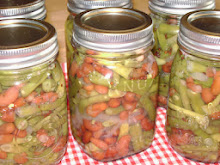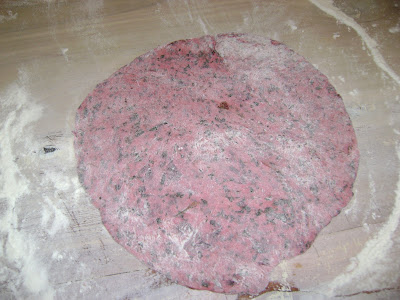Yes, it's not the lighting or the camera, the tortillas are really pinkish red in color.
I call them "Indian Summer," which is not to far off from the Hopi Red Dye Amaranth that I used to prepare them. In a previous post I shared using Amaranth Seeds ground into flour to make homemade pasta.
But here I am using the very young leaves of the Amaranth plant, also known as Indian Spinach. It is remarkably flavored just like normal green spinach you would grow in the garden. I do make the tortillas using regular spinach as well as using several other vegetables from the garden for different flavors.
But here I am using the very young leaves of the Amaranth plant, also known as Indian Spinach. It is remarkably flavored just like normal green spinach you would grow in the garden. I do make the tortillas using regular spinach as well as using several other vegetables from the garden for different flavors.
Freshly harvested Hopi Red Dye Amaranth (Young tender leaves)
Most people who love to garden, also love to cook. I happen to love to bake and am always trying new and creative ways to use the harvest.
In Texas we love our warm freshly made tortillas. I really began making my own out of desperation, and well, one thing led to another. The fact is you simply cannot buy lovely tortillas that are not made with lard or saturated fats, shortening, preservatives, artificial colors and the list goes on.
It is indeed difficult to make them without all that bad stuff and to have them taste as good. But I searched and experimented and finally came up with a sure cure fix to an excellent homemade tortilla that frankly beats the socks off of any others.
This recipe uses pure organic unadulterated ingredients and can be made plain or spiffed up to any flavor you desire.You won't believe how easy they are to make. This recipe makes 8 tortillas.
Ingredients
2 cups + organic unbleached bread flour
1 1/2 tsp baking powder
1 tsp sea salt
2 tsp organic sunflower oil
3/4 cup organic whole milk (warm)
Steamed Chopped Spinach or Amaranth (to make one over sized cup after cooked)
A Nice Round Soft and Sticky Dough Ball
Directions
1. First, clean and wash your spinach, then chop it up. You will need to at least double up the amount used fresh, because once you steam it, it will of course shrink. Once steamed, set it aside to cool and drain of some its moisture.
2. Next, in a small sauce pan heat your milk on low, just enough to get it warm.
3. In your mixing bowl, combine all the dry ingredients and whisk with a wire whisk. Start with the 2 cups of flour. You may need to add a little extra once you add the rest of your ingredients. Add your oil and 1 good cup of your chopped spinach.
4. You can make this dough by hand or take it to your mixing stand and add the dough hook. Mix on the 2nd setting of your mixer and add the milk a little at a time. The dough will be sticky by should begin to pull away from the sides of the bowl. If it is still soupy add a little more flour. Start with just 1/4 cup a go from there.
5. Dump the dough out onto a lightly floured surface. Dust the top of the dough and knead until a nice soft pliable dough ball forms. It should still be very soft and a bit sticky. Do not over work the dough. Doing so will cause your tortillas to become stiff instead of soft and fluffy.
6. Place dough ball into a lightly oiled bowl and turn it once to coat it. Cover it with plastic wrap and then place a towel over it. Set in a warm place and let the dough rest for 20 to 30 minutes.
Dough Cut into 8 equal pieces
7. Once your dough has rested, turn it out onto your lightly floured surface. Form the dough into a tube shape of sorts and cut it into 8 reasonably equal pieces. Cover with a towel and let the pieces rest for 10 minutes. While it is resting get out your cast iron skillet, a metal spatula and rolling pin.
Rolled out dough just like a pie crust
8. The next step is to flatten out a piece with the palm of your hand, keeping it in a circle. Next begin rolling it out from the middle towards the outsides, much like you would a pie crust. Lightly dust with flour is dough becomes to sticky. Flip it over and roll from the other side. Do each piece and set them aside until they are all rolled out. The key here is roll them as thin as possible, but not so thin they become hard to work with.
9. Turn your stove top on high heat and begin to get your cast iron skillet hot. Once it is hot, you may turn it down to medium depending upon your stove.
It is fine to use a tiny bit of oil in the skillet, however I found no purpose for doing so. The cook perfectly without it. Place one of your tortillas on the skillet. Let cook approximately 20 to 30 seconds on each side.
The tortilla will puff just a little around the edges when it is done. Keep a close eye to be careful not to burn them. Set each one on a wire rack, just long enough for the next tortilla to almost be done.
I keep a tortilla keeper handy and set each one inside stacking them while they are still just barely warm. When they are completed I put the lid on. Let them completely cool and then flip the entire stack inside the keeper to keep the bottom tortilla from getting soggy. This process keeps them soft.
Tortilla Keeper
Of course I cannot share this recipe without a little Native American History. Since we are baking with Hopi Red Dye Amaranth in this recipe I must share.
When a Hopi woman found a man in which she wished to marry, she would bake a special bread made of cornmeal and amaranth called Piki Bread.
It would be a reddish colored bread. She would take her bread to the home of the man she wished to marry and leave it at the door step for the mother of the hopeful groom to be.
If the mother brought the bread inside, then it meant that the marriage was approved. Many times a brother of the hopeful groom or a friend would bring the bread inside so the young woman would not be embarrassed.
The mother would then taste the bread as well as the mothers sisters, aunts, grandmother...all the women would decide if the woman's bread was worthy to marry.
There is much more to the tradition and the story but for now, perhaps for the single ladies, we should begin to bake!!
When a Hopi woman found a man in which she wished to marry, she would bake a special bread made of cornmeal and amaranth called Piki Bread.
It would be a reddish colored bread. She would take her bread to the home of the man she wished to marry and leave it at the door step for the mother of the hopeful groom to be.
If the mother brought the bread inside, then it meant that the marriage was approved. Many times a brother of the hopeful groom or a friend would bring the bread inside so the young woman would not be embarrassed.
The mother would then taste the bread as well as the mothers sisters, aunts, grandmother...all the women would decide if the woman's bread was worthy to marry.
There is much more to the tradition and the story but for now, perhaps for the single ladies, we should begin to bake!!
- We that with like hearts love, we lovers twain,
- New wedded in the village by thy fane,
- Lady of all chaste love, to thee it is
- We bring these amaranths, these white lilies,
- A sign, and sacrifice; may Love, we pray,
- Like amaranthine flowers, feel no decay;
- Like these cool lilies may our loves remain,
- Perfect and pure, and know not any stain;
- And be our hearts, from this thy holy hour,
- Bound each to each, like flower to wedded flower.
~Joachim du Bellay "A Vow To Heavenly Venus," ca. 1500
Happy Gardening!!
Pammy

























.jpg)



















These were delicious, and beautiful.
ReplyDeleteHi Deanna! I'm so glad you got to make them! I've been getting a lot of practice since I first started the adventure of making my own. I discovered that the thinner you can get them rolled out the better. I'm actually getting about 15 tortillas out of this recipe now. I also started grinding up flax seed to add to them. Very fun!! Thanks for visiting xox
Delete